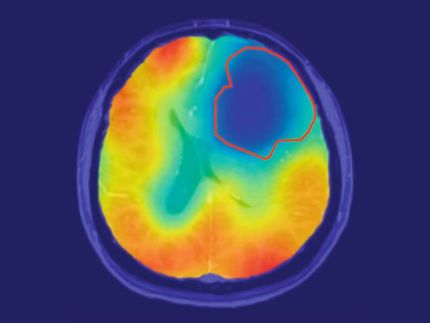New MRI technology makes cancer visible at an early stage
MRI signal amplified 24,000-fold: University start-up QuantView develops highly sensitive contrast agent
Advertisement
Detecting cancer cells before they spread - this is what the start-up QuantView from Kiel is working on. The spin-off from Kiel University (CAU) has developed a method with which magnetic resonance imaging (MRI) can be used much more sensitively. Using a new type of contrast agent and a signal amplification process, the team can make tumor remnants visible that conventional MRI has not been able to detect so far.
QuantView was founded in 2023, but has only now been officially launched: With the conclusion of the license agreements with the university, the company is now operationally ready to act. Schleswig-Holstein's Science Minister Dr. Dorit Stenke visited the company for the official kick-off at the beginning of July.
Technology for high-precision diagnostics
QuantView detects cancer cells via their metabolism. At its core is a patent-pending contrast agent based on pyruvate, a natural substance of the sugar metabolism.
Healthy cells and cancer cells process sugar differently. Tumor cells prefer to convert pyruvate into lactic acid, thereby generating a clear metabolic signal. After the injection, areas with high lactic acid production glow brighter in the MRI and thus reveal active cancer cells.
The contrast agent used by QuantView contains hyperpolarized pyruvate. Using the physical method PHIP+ (Parahydrogen Induced Polarization), the team brings almost all atomic nuclei of the sample into the same magnetic alignment and amplifies the MRI signal by a factor of 24,000. This enables the system to detect even the slightest metabolic changes in the tumor.
The basic procedure has been known for around 14 years - it was optimized by Professor Rainer Herges' team at the Institute of Organic Chemistry in collaboration with the Biomedical Imaging Department at Kiel University. The decisive step was the development of the new pyruvate contrast agent. "Polarization with PHIP+ now only takes two minutes instead of two hours," says Herges. "At the same time, the required device is now much more compact and cost-effective."
First studies planned for 2026
QuantView is currently working on the preclinical development of the PHIP+ technology. The aim is to start the first clinical trials next year. These studies still need to be financed - the company is seeking public research funding and is actively looking for investors. At the same time, QuantView is preparing to license the technology to industrial partners in order to promote its application worldwide.
The CAU supported QuantView from the idea to the spin-off: The Transfer division provided support with patenting and technology transfer. The start-up is also benefiting from the university in the current growth phase - it is using CAU infrastructure free of charge. This opportunity is part of the new spin-off funding recently approved by the Presidential Board. In addition to Rainer Herges, chemist Dr. Arne Brahms and entrepreneur Dr. Stefan Kloth are part of the Quantview team.
Note: This article has been translated using a computer system without human intervention. LUMITOS offers these automatic translations to present a wider range of current news. Since this article has been translated with automatic translation, it is possible that it contains errors in vocabulary, syntax or grammar. The original article in German can be found here.
Other news from the department business & finance
Most read news
More news from our other portals
Something is happening in the life science industry ...
This is what true pioneering spirit looks like: Plenty of innovative start-ups are bringing fresh ideas, lifeblood and entrepreneurial spirit to change tomorrow's world for the better. Immerse yourself in the world of these young companies and take the opportunity to get in touch with the founders.
See the theme worlds for related content
Topic world Diagnostics
Diagnostics is at the heart of modern medicine and forms a crucial interface between research and patient care in the biotech and pharmaceutical industries. It not only enables early detection and monitoring of disease, but also plays a central role in individualized medicine by enabling targeted therapies based on an individual's genetic and molecular signature.

Topic world Diagnostics
Diagnostics is at the heart of modern medicine and forms a crucial interface between research and patient care in the biotech and pharmaceutical industries. It not only enables early detection and monitoring of disease, but also plays a central role in individualized medicine by enabling targeted therapies based on an individual's genetic and molecular signature.























































